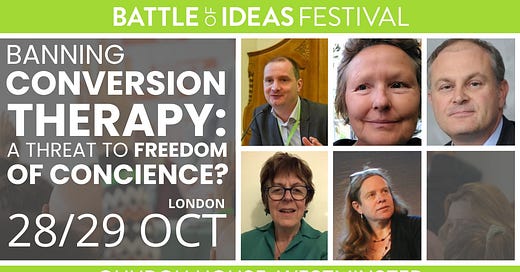Does banning conversion therapy pose a threat to freedom and conscience?
How do we balance protection against abuse with freedom of speech? Join us at the Battle of Ideas festival to debate...
Free subscribers to this Substack get 10% off weekend and one-day Battle of Ideas festival tickets using promo code Substack-BOIF23 (or use our special link here).
AoI Associates get even bigger discounts, and our paid Substack subscribers can use these Associate rates, too. Now is the time to buy, with the deadline for our ‘Early Bird’ prices coming up this week:
Gender critical and free speech campaigners celebrated this weekend, after a report in the Sunday Times revealed that the government is no longer bringing forward its proposed bill banning conversion therapy. Successive Conservative governments have changed their position on this controversial legislation several times since it was first proposed by Theresa May in 2018, and it is unlikely that this latest announcement is by any means the end of the matter - especially with the prospect of Labour, who have pledged to ban the practice in all its forms, forming the next government.
With a mounting number of countries across the world having introduced some form of national ban on conversion therapy, and other states, cities and provinces looking to do the same, the UK government will be under pressure to proceed with its controversial Conversion Therapy Bill. After some rows about who might be included in the Bill, the government indicated it will ban ‘all forms of conversion therapy in England and Wales – including those targeting trans people’ – stopping attempts to induce young people and ‘vulnerable adults’ to switch their sexual orientation. In any event, critics argued that the draft legislation did not go far enough and there was concern about a possible ‘consent loophole’ that would have allowed adults to consent to the practice in some circumstances.
According to the government, the Bill intended to ‘protect people’s personal liberty to love who they want to love’. But some groups, and NHS England, insist that all forms of conversion therapy are ‘unethical and potentially harmful’ – and should be banned entirely.
There are also concerns on both sides of the trans debate. On the one hand, there is concern that the rights of transgender people and those questioning their gender identity are not protected by the law. Others worry that legalisation may well interfere in the counselling of young people suffering gender dysphoria.
Should we seek to protect LGBT people from such therapies, or should adults be allowed to make their own decisions? Does the very existence of such therapies undermine and disrespect gender fluid, gender questioning, or other LGBT people? What about the argument that gender ideology itself is a form of conversion therapy, aimed at lesbian and gay sexuality?
Others worry freedom of speech will be undermined for medical professionals, teachers or religious groups – who often find themselves offering advice on sex and gender. Would any Conversion Therapy Bill ban ‘spiritual guidance’ about sexuality, even between people who hold the same religious beliefs? What is the line separating discussing someone’s life choices and options with attempts to ‘convert’ them?
What constitutes the legitimate exercise of conscience when practical conflicts arise, for example, with anti-discrimination equality laws or medical-service provision? Can freedom of conscience interfere with the rights of some groups to live free from intimidation? How should we proceed when matters of conscience come into conflict with external pressures and expectations?
All of these issues will be discussed and debated at Banning conversion therapy: a threat to freedom and conscience? at the Battle of Ideas festival on 28 & 29 October 2023.
With 100+ debates, 400 speakers and 3,000+ attendees over 48 hours, join us to get to grips with the major public debates of the year. From the challenges of AI to the culture wars, the cost-of-living crisis to international instability – at the Battle of Ideas festival, FREE SPEECH is not just allowed, it's encouraged.
Speakers on conversion therapy include:
Dolan Cummings: author, The Pictish Princess.. and other stories from before there was a Scotland
Stephanie Davies-Arai: director, Transgender Trend; author, Communicating with Kids
Lord Stewart Jackson: Conservative peer, House of Lords
Bev Jackson: co-founder and trustee, LGB Alliance
Katy Jon Went: diversity and inclusion facilitator and educator, Human Library, Pick My Brain, GenderAgenda, Fifty Shades of Gender
CHAIR - Ann Furedi: author, The Moral Case for Abortion; former chief executive, BPAS





Before any discussion of this issue, namely conversion therapy, can commence, surely we need a definitive definition of what conversion therapy actually is. In the middle of the twentieth century it was a brutal de-humanising process involving electric shocks and even sometimes lobotomy. This is what most people think of when hearing the term. But trans ideologues now refer to any ‘talking’ therapy designed to explore and find reasons for an individual’s discord between their psyche and their physiology as conversion therapy. Any conversation other than affirmation of “being born in the wrong body” is regarded in the trans activists world as conversion therapy.